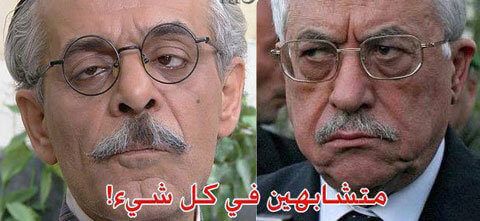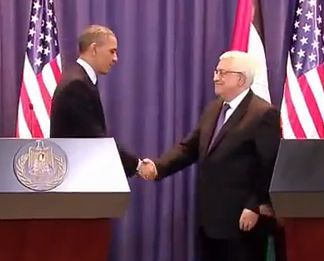Western correspondents rely heavily on Palestinian reporters, photographers, cameramen and a range of other helpers to cover the West Bank and Gaza. So when the Palestinian Authority and Hamas crack down on media freedom, it’s a direct assault on free expression and the public’s right to know.
In recent days, media freedom has deteriorated in both the West Bank and Gaza. Palestinian journalists are complicit in some of these disturbing developments. Seen together, they point to a hostile attempt to control information.
1. Mahmoud Abbas imposed dramatic restrictions on foreign reporters working in the West Bank. Khaled Abu Toameh explains:
The new decision is directed primarily against Israeli journalists who cover Palestinian affairs. Recently, many Palestinian journalists complained that it was unacceptable that their Israeli colleagues were being allowed to operate freely in Palestinian territories while they did not have permission to enter Israel. They also complained that the Israeli Government Press Office was refusing to issue them press credentials.
The Palestinian journalists demanded that the Palestinian Authority impose restrictions on the work of both Israeli and international reporters . . .
So while the Palestinian journalists are promoting a boycott of Israel, they are also demanding that the Israeli government issue them with press cards so they can enter Israel . . .
Particularly disturbing is that representatives of the international media have not protested against the Palestinian Authority’s threat to restrict the journalists’ work and even arrest them. One can only imagine the response of the international media had the Israeli authorities issued a similar ban or threat.
Indeed, the silence of the Foreign Press Association in Israel and the Committee to Protect Journalists is deafening.
2. The PA jailed a journalist for “insulting” Mahmoud Abbas on Facebook.
A PA court convicted Bethlehem-based journalist Mamdouh Hamamreh for a Facebook post comparing Abbas to a villain in a popular Syrian TV show. Hamamreh was sentenced to one year in prison. But the bad publicity spread, picked up by AP, and the NY Times, and the next day, Abbas pardoned Hamamreh, saying he was “disturbed” to learn of the charges. But I’ll give the last word to a former Palestinian mover and shaker who told AP:
“It’s a good cop, bad cop routine. The bad cops are the security services, and the good cop is the benevolent president,” said Diana Buttu, a former Palestinian Authority insider. They want to send a chilling message, she said, “and it works.”

Commenting on the blow-up, Elliott Abrams raises another reason Abbas backed down:
The PA is perennially short of funds and reliant on American and European aid. Turning the PA back into the kind of dictatorship we saw under Arafat will endanger that aid, as it should. Punishing people for the “crime” of “insulting the president” will appear to European and American legislators to be particularly repellent to their democratic traditions– as it is to international human rights laws.
3. Hamas is drafting media “regulations” of its own. Al-Monitor says a lot of Gaza journalists boycotted a Hamas-run forum to discuss the laws:
The 17-page, detailed draft included regulations for both print and broadcast media, and insisted on the right of freedom of expression in its first chapter but continued with many restrictions in later pages.
“Mass media are banned to publish or broadcast sacrilegious materials, secretive information about the security apparatus, inciting reports that aim to create state of chaos and all what might harm the state’s icons,” one of the most controversial articles read.
The new law also banned bringing in any publications that don’t meet these restrictions.
4. The Palestinian Authority banned news coverage from Hebron when anti-US protests ahead of President Obama’s visit were too embarrassing. Moreover, when President Obama visited the Muqata, a number of accredited journalists planning to cover the meeting received last-minute cancellations from the PA’s Preventive Security Services:
After a quick look at the list of journalists blocked from access, however, one realizes they all at one time or another had written or said something critical of the Palestinian leadership . . .
What undermines the idea that the 18 banned journalists posed a security threat is that they have covered high-profile visits to Palestine for years, including by US officials.

5. A report on Palestinian press freedom in 2012 documented a lot of violations by Fatah and Hamas — 74 in all. According to the report published Palestinian Center for Development and Media Freedom (MADA):
Most notable types of violations were: prevention from travel, raiding of media institutions, preventing journalists from coverage, arrests, detentions, physical abuse, interrogations, trails, threats, and closing and blocking media sites.
Mr. Alruri pointed that detention is still the most prominent violations that have been monitored as it recorded during 2012 12 cases in comparison to 5 cases in 2011, in addition to the continued policy of calling journalists for investigation and interrogation with 13 violation reported, in addition to closing and blocking media sites, and prevention of travel.
(Image of press conference via YouTube/whitehouse)

